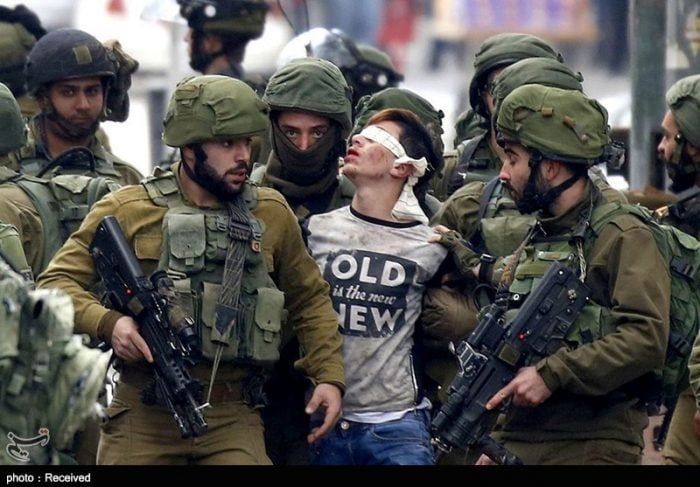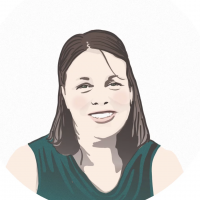As visitors from Israel cross into the West Bank, they see bright red signs with a warning to Israeli citizens that it is forbidden to cross and “dangerous to your lives.”
A similar warning sits at the top of many travel sites, Warning: Some western governments have issued a severe travel warning against traveling to Palestine, due to violent incidents and armed conflict that can occur at any time.
This is a tactic meant to scare people away. The people of Palestine are no more dangerous than any other group of people around the world. In fact, if anyone’s life is disproportionality at risk, it is the young people of Palestine.
In late August of 2019, I stood outside the YMCA in Beit Sahour, a town in the West Bank near Bethlehem, waiting to meet a friend. It was dark, but I could see that the end of the road was blocked. I couldn’t tell if it was the Israeli police or the Palestinian Authority. Either way, I was not too comfortable.
Then, I saw my young friend walking up to the gate a bit concerned about the roadblock as well. Because of it, he had to leave his taxi behind to come meet me. We had to get another taxi to take us into Bethlehem, where we would pick up a shared taxi and drive the rest of the way to his home in Beit Ummar.
He was on his way home from his job in Ramallah. Ramallah is only about 30 miles from Beit Ummar, but because of the occupation and the military checkpoints, it usually takes him over four hours to get home.
Once in the shared taxi, he told me his mom had made us maqluba, a Palestinian dish of chicken and rice. I felt bad because it was nine p.m., which seemed pretty late to me. I would have been in bed if I was home. He reassured me that she loved to show her hospitality by cooking for his friends, and besides, it was still early.
I sat beside him quietly as my body leaned into the turns the taxi was making—we were getting closer. I saw the Israeli settlements in the distance, glittering on the hills like Christmas tree displays. They were quite a contrast to the lowly lit Palestinian villages below.
As we came to a roundabout, I saw a group of Israeli settlers. They were dancing, surrounded by Israeli military, guns at the ready to protect them. One settler was draped in a large Israeli flag. One of the passengers in the van shook his head and muttered something. I could not understand. My friend translated, “Someone died last night, and they dance and sing?”
The person who had died was a settler from Gush Etzion. The Etzion Bloc is a cluster of Jewish settlements located directly south of Jerusalem and Bethlehem. These Jewish settlements were founded in 1940. This area was left outside of Israel after the 1948 war. But the settlements were soon rebuilt after the 1967 Six-Day War.
Since that time, the Israeli government has continued to annex Palestinian lands at an alarmingly high rate. The Gush Etzion settlement has grown significantly each year and now consists of 20 settlements with a population of over 70,000. This confiscation of Palestinian land directly challenges fundamental Palestinian rights, including their right to self-determination. The acquisition of territory by force and denial of self-determination amounts to a serious breach of international law.
Because of the murdered settler, the Israeli police were on high alert, which was probably why the road to the YMCA had been closed. It was assumed that the murderer was a Palestinian—in fact, in most cases, it is assumed that a Palestinian is to blame.
It is likely a number of Palestinian homes will be raided, resulting in many Palestinians being arrested and jailed in the coming days. Some of them might even be shot or harmed in other ways.
The international community considers Israeli settlements in the West Bank illegal under international law, but the Israeli and United States governments dispute this.
International law also prohibits the use of live ammunition on civilians, except as a last resort, however, Israeli soldiers often fire live bullets at Palestinians during confrontations. When settlers move into the West Bank, they bring the Israeli military with them for protection.
This military presence has a significant effect on the youth of Palestine, mostly those in the age range of 16-24. This is the age group most likely to be imprisoned, kneecapped, or killed by the occupying forces (investigations have shown that live fire has been directed at the lower limbs of Palestinian youth, particularly the knees, which prompted the use of the term “kneecapping” to refer to these incidents).
When we finally arrived at the entrance to Beit Ummar, we were let out to cross beyond the gate on foot. I didn’t see anyone watching us, but my friend assured me the guards were there—always.
Beit Ummar is a Palestinian town northwest of Hebron with a population of 20,000, almost 5,000 of the residents are under the age of 18. Beit Ummar has been under Israeli occupation since 1967. Since that time, Israel has confiscated about 4,000 dunams (one dunam is about one fourth of an acre) of village land in order to construct Israeli bypass roads and settlements like Gush Etzion.
As we waited for his brother to pick us up, he explained that his brother had recently been released from prison. This was not as surprising as it might sound—most Palestinians spend some amount of time in prison. It might be for picking up a rock and throwing it at Israeli soldiers or for not following orders during an early morning raid.
Most of his brothers, and indeed most of his family, have spent some time in jail. It’s no big deal he wanted me to know; his village is safe. But he also told me how his cousin was shot in the head last year because soldiers said he was protesting. He was walking with a group of friends and the Israeli military told him to stop, but he ran. He was the tallest—an easy target.
When we finally arrived, I met his three-year-old nephew. He immediately called me “auntie” and told me he loved me. He began to show off his new toy truck and proudly let me know that his little brother had just learned to walk. I welcomed the pleasure of seeing little ones the same ages as my own grandchildren.
It made me happy, but also sad. I thought of all the young children in prison (I had just learned a four-year-old was taken into custody for throwing a rock.).What would be their future? Would this little boy and his brother end up in prison too? Kneecapped? Or, even shot to death?
Most children are only held a day or two, but today there are around 300 Palestinian children under the age of 18 in Israeli prisons. Some are held until a trial date, which can take years to get. If they are found guilty of throwing a rock, they can receive up to a 10-year sentence if the intent is not proven, and a 20-year sentence if proven to have been thrown with the intent of causing bodily harm—which does not include the time they have already served.
My friend’s nephew is familiar with the Israeli soldiers. He knows them by name and has been given tours to the top of their watchtower (“sniper towers” as the locals call them). But this familiarity will not provide him with any security if he were to someday pick up a rock or run in the wrong direction.
Just as I had begun to wonder if the family would ever go to bed, at around two a.m., the little boys’ mother began to pack up for the refugee camp where she lives with her husband. I learned that many Palestinian families, especially those in the refugee camps, resist going to bed for fear of the raids that come in the early hours. The raids consist of a bright spotlight from the watchtower flooding their home as a group of four or five soldiers force everyone out of bed while they search their homes. 17
I fell asleep wondering if a floodlight would wake me.
It did not, but soon enough I was awakened by strong Arabic coffee followed by amazing plates of hummus, za’atar, baba ghanoush, yogurt, eggs, olives, freshly sliced tomatoes, cucumbers, and pita bread. This was Palestinian hospitality at its finest.
As I ate with the family, their grandparents’ faces looked down from pictures on the wall, smiling at us. Would they ever have imagined that their children and grandchildren would be living under such an occupation?
Could the people who built this house and raised their family here ever imagine the dangers outside its walls now?
In January of 2020, following the announcement of President Trump’s so-called “peace plan” for Israel, Israeli Prime Minister Benjamin Netanyahu vowed to annex up to 30 percent of the occupied West Bank. UN officials consistently call this move illegal.
It is not just illegal, but it poses a threat to all the people living in those areas now.
Red signs tell visitors to be worried about the people who live here. That is a lie that creates a false narrative of fear. But there is also a bigger lie—the original lie. The one that said Palestine was “a land without a people.”
Where is the justice for those who were forced to leave and those who may be forced to leave now? History tells us that justice often comes too slowly. How long should we wait?
The Palestinians deserve better from those who know better.
My life is not at risk; maybe your life is not at risk, but there are lives at risk, and all the signs point to facts we cannot ignore.
~









Read 18 comments and reply